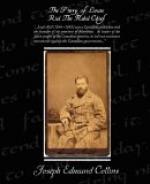Q.—Well?
A.—He accused me of neglecting them. I told him it was simply a matter of opinion, that I had certainly taken an interest in them, and my interest in the country was the same as theirs, and that I had advised them time and again, and that I had not neglected them. I also said that he had neglected them a long time if he took as deep an interest as he professed to. He became very excited, and got up and said, “You don’t know what we are after—it is blood, blood; we want blood; it is a war of extermination. Everybody that is against us is to be driven out of the country.” There were two curses in the country—the Government and the Hudson Bay Co. He further said the first blood they wanted was mine. There were some little dishes on the table, and he got hold of a spoon and said, “You have no blood, you are a traitor to your people, your blood is frozen, and all the little blood you have will be there in five minutes”—putting the spoon up to my face, and pointing to it. I said, “If you think you are benefiting your cause by taking my blood, you are quite welcome to it.” He called his people and the committee, and wanted to put me on trial for my life, and Garnot got up and went to the table with a sheet of paper, and Gabriel Dumont took a chair on a syrup keg, and Riel called up the witnesses against me.
At this juncture Riel was called away to attend a committee meeting of the rebel government. Subsequently, by the mediation of Hillyard Mitchell, Riel’s wrath at McKay was placated, and he was allowed to return to Fort Carlton with his intercessor. Before leaving, Riel apologized to McKay for what he had said to him, and asked him to join the insurgents, which witness, of course, would not do, being a loyal half-breed and a volunteer in the ranks of the Prince Albert contingent with Crozier at Fort Carlton.
McKay then detailed the incidents of the disastrous engagement with the rebels at Duck Lake, and gave strong testimony to criminate Riel, which the counsel for the defence utterly failed to shake.
The next witness WAS JOHN ASTLEY, surveyor of PRINCE ALBERT, who was long prisoner of Riel’s at Batoche, and the rebel chief’s messenger on the day of the taking of the village by the loyal forces under Middleton. The witness gave a vivid description of his capture and imprisonment by Riel, and his subsequent release by the volunteers at Batoche. Riel acknowledged to him that he ordered his men in the name of the Almighty to fire at Duck Lake. He did not do so, however until, as he thought, the police had fired. Riel told him he must have another fight with the soldiers to secure better terms of surrender from Gen. Middleton.




